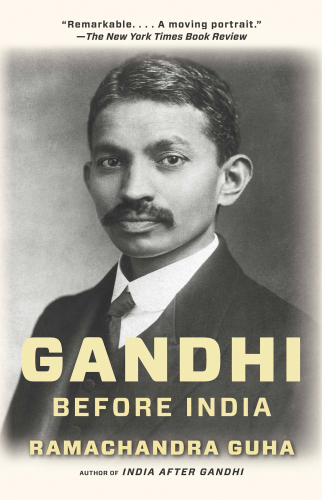
Gandhi Before India
کتاب های مرتبط
- اطلاعات
- نقد و بررسی
- دیدگاه کاربران
نقد و بررسی

Starred review from January 20, 2014
This first volume in a two-part biography of Gandhi from Guha (India After Gandhi) proves itself an essential work for its bold purpose, extensive research, and engaging prose. Seeking to address scholarly reliance on the Mahatma’s own writings, Guha looks to a broader range of primary sources, including both Gandhi’s allies and detractors, to explore his “less known and sometimes forgotten” early career. We experience Mohandas Gandhi as he lived and evolved into an “authentically global” prophet of peace, engaged in a process of “dialogue and reconciliation” with a conflicted world. Much of the book chronicles Gandhi’s rise to prominence in South Africa, where he arrived as a multilingual barrister capable of translating between the British and the Indian diaspora. This ability to bridge communities became a foundation for the “unique spirit of ecumenism” that Gandhi developed into a passive resistance philosophy supported by both Eastern and Western precedents. His religious journey was paramount, as he grew beyond the orthodox Hinduism and dietary restrictions of his caste by incorporating perspectives from the Christians, Muslims, Jews, and vegetarians (the Vegetarian Society was his primary social outlet) he befriended throughout his career. Through this excellent volume, Guha demonstrates his deep affinity for the Mahatma with an honest examination of his personal development. Maps & illus.

March 1, 2014
The first in a two-volume biography of Gandhi (1869-1948) by a seasoned Indian scholar distinguishes itself from legions of others by its clarity and many facets. Guha (India After Gandhi: The History of the World's Largest Democracy, 2007, etc.) relishes Gandhi's inconsistencies ("Sometimes he behaved like an unworldly saint, at other times like a consummate politician") and has evidently delved beyond his collected works for material--e.g., unexplored letters to colleagues, children and even his enemies. Spanning his subject's early era, the author moves from Gandhi's rather middling upbringing in the merchant caste of Kathiawar in the western Indian state of Gujarat, the youngest son of a polygamous civil-servant father and a pious, vegetarian mother. He then examines Gandhi's revelatory law apprenticeship in London, the attempts at establishing himself as a barrister in Bombay, and the discovery of his livelihood and life's calling defending Indians and Muslims against discriminatory policies in the Transvaal, South Africa. Being a vegetarian law student in London brought the young Gandhi into the eclectic circle of the London Vegetarian Society, influenced by the work of Henry Salt. Gandhi also befriended numerous people of different religions and backgrounds, cultivating the kinds of rich friendships across class, ethnic and gender lines that defined his evolving work as a social reformer. Married as a teenager, he was always aware of having to provide for his family and educate his sons, a duty that spurred him initially to ply his trade as a journeyman lawyer in Durban. Establishing the newspaper Indian Opinion in 1903, he wrote copiously, developing his ideas on diet, moral economy and passive resistance. Upon reading John Ruskin and Leo Tolstoy, Gandhi moved the newspaper out to Phoenix, outside of Durban, in the first experiment in utopian self-sufficiency. Guha offers a full, relaxed portrait of how the "Mahatma" came to be, as he gained his voice as a writer, seeker and leader.
COPYRIGHT(2014) Kirkus Reviews, ALL RIGHTS RESERVED.

March 1, 2014
In the first book of a projected two-volume biography of Mohandas Gandhi (1869-1948), Guha (India After Gandhi) demonstrates his academic depth. Rather than detailing Gandhi's years in South Africa (1893-1914) as in a vacuum, Guha discusses the leader's continued ties with India and Britain. He explains the formative role of Gandhi's legal education in London, the influence of his readings (e.g., Tolstoy and Ruskin), and, primarily, his subsequent work as a human rights leader in South Africa, highlighting Gandhi's shaping of his satyagraha (nonviolent resistance) as he evolved from lawyer to leader of South Africa's thousands of imported Asian workers. Transcending caste, religion, and ethnic division, Gandhi effectively challenged discriminatory laws and practices in the Transvaal and in South Africa as a whole. However, his moral vision did not embrace South Africa's native African majority. Guha also focuses on Gandhi's long-suffering wife, Kasturba, and troubled relationship with son Harilal. VERDICT This is an important biography, but the level of detail can be excessive and may try the patience of all but determined readers. Nonetheless, recommended to all students of Gandhi.--Zachary Irwin, Behrend Coll., Penn State, Erie
Copyright 2014 Library Journal, LLC Used with permission.

Starred review from March 1, 2014
For many Westerners, the mention of Gandhi evokes stock images of the frail, scantily dressed Indian spouting tomes about peace and brotherhood while leading a noble, nonviolent struggle for Indian independence. Relatively few realize that Gandhi spent decades living outside of the subcontinent, in Britain and especially in South Africa. Guha, who has taught courses on Gandhi at Stanford and Yale, covers his life from his birth in British India, in 1869, up to his departure from South Africa and return to India in 1915. There is much that is familiar here, including Gandhi's asceticism, his passion for justice, and his gift for savvy political maneuvering. But Guha's account is full of surprises. In Britain, as a young barrister, Gandhi moved freely with a liberal and racially diverse crowd and proudly viewed himself as a citizen of the Empire while dressing stylishly. In South Africa, the rigid racial divisions shocked him, and it was here that he developed the tactics that he employed so effectively later in India. This is an outstanding opening volume of a planned two-volume biography of one of the most widely revered but often misunderstood figures in world history.(Reprinted with permission of Booklist, copyright 2014, American Library Association.)

























دیدگاه کاربران